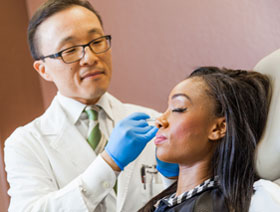 There are many websites and “resources” that claim to provide expert skin care advice. While some can be a good source of information, many provide readers with inaccurate content in an effort to sell products. Today we are going to debunk some common skin care myths while learning a bit about our skin, the body’s largest organ.
There are many websites and “resources” that claim to provide expert skin care advice. While some can be a good source of information, many provide readers with inaccurate content in an effort to sell products. Today we are going to debunk some common skin care myths while learning a bit about our skin, the body’s largest organ.
Myth #1: Poor hygiene causes acne
Acne occurs when pores are clogged by a combination of sebum (an oily substance produced in the skin), dead skin cells and bacteria. Unfortunately, face washing alone doesn’t solve the problem. Hormones, especially androgens, play a significant role in the development of acne. During puberty, androgen levels increase in both males and females, causing the sebaceous glands to produce more sebum. A family history of acne also raises the risk of developing the condition, and if you already have acne, certain factors including stress can make it worse. Those with acne should try to refrain from touching their face with unwashed hands. Seemingly innocuous things such as having your cell phone pressed against your cheek for long periods of time can also cause breakouts. Although it may seem counter-intuitive, people with acne-prone skin should still use a moisturizer. Topical acne treatments tend to dry out skin, stimulating an overproduction of oil, and a non-oily moisturizer can help prevent this.
Myth #2: A tanning bed will help your body produce Vitamin D.
In short, there is no safe or appropriate use of tanning beds. With regard to vitamin D, there are two types of UV rays that reach the earth’s surface— UVA and UVB. UVA rays penetrate deep into the skin, causing wrinkles and premature aging while UVB rays cause sunburn and stimulate the skin to produce vitamin D. Since tanning beds bathe their occupants only with UVA rays, there is absolutely no vitamin D benefit to using a tanning bed. To debunk another myth at the same time– there is no such thing as a “healthy” tan. Consequently, we don’t recommend using a tanning bed for any reason at all.
Myth #3: Most of your lifetime sun damage has already happened by the time you are 18.
This is probably the most dangerous myth out there as it gives people in their 20s, 30s, and beyond an excuse to not use sunscreen regularly or appropriately. The truth is that only about 25% of the sun damage you’ll incur in a lifetime occurs by the time you are 18; thus most of your exposure will happen as we age. It is true that if you experience one or more blistering sunburns during childhood or adolescence, your risk of developing melanoma doubles, but that is only more reason to protect yourself during adulthood by using sunscreen with an SPF of 30 or higher every day. Women should wear sunscreen even if their regular makeup has an SPF, and everyone, male or female should re-apply often, especially if you are sweating, spending time in the water, or outside for prolonged periods of time. Using a topical antioxidant in addition to your sunscreen is another way to protect your skin. Topical antioxidants work by neutralizing harmful free radicals. One more thing worth mentioning– SPFs aren’t cumulative; the highest number is your maximum protection. So if you are wearing makeup with an SPF of 15 and a sunscreen with an SPF of 30, your skin’s SPF is 30 (not 45).
Myth #4: Common skin care products with collagen and elastin can help reverse the signs of aging.
Collagen and elastin are proteins that keep our skin firm, healthy and youthful-looking. As we age and lose these proteins, our skin begins to wrinkle and sag. However, collagen and elastin cannot be replenished through a topical cream; the molecules are too large to be effectively absorbed into the skin. However, there are ways to stimulate the skin to produce more collagen, such as microneedling or certain laser treatments, but these treatments should only be performed at your dermatologist’s office.
Myth #5: Products labeled “natural,” “organic,” “hypoallergenic” or “dermatologist-recommended” are better for skin than regular products.
If you have sensitive skin, you might be on the lookout for skin care products that can help you avoid redness, outbreaks or inflammation. However, many product labels can be misleading, and often there is no specific requirement for products to be able to use these types of labels. For example, the term “dermatologist-recommended” simply means that one dermatologist felt that the product was a good one. Many “natural” or organic products can be abrasive or irritating. And there are little to no ingredient restrictions or regulations on what can be labeled “hypoallergenic” or “non-comedogenic” (meaning it won’t clog pores). If you have sensitive skin, opt for products recommended by your dermatologist, as they will understand the types of ingredients that will be most appropriate and beneficial for your skin type.


